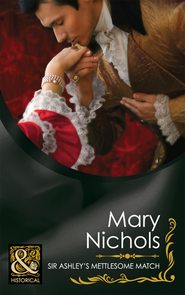По всем вопросам обращайтесь на: info@litportal.ru
(©) 2003-2024.
✖
The Price Of Honour
Настройки чтения
Размер шрифта
Высота строк
Поля
To the French with whom she had lived for the past year she was English, and without Philippe to protect her she had no idea how they would view her reappearance, even supposing she could find them again. The British would, she was almost sure, look on her as a traitor, and she had no idea what punishment would be meted out for that, but whatever it was she would have to face it. It might be mitigated by the fact that she did have something to tell them. She knew the dispositions and the strength of the French army in the north and that it was unlikely that Marshal Soult, comfortably ensconced in the south, would come to their aid; Philippe had been more than a little indiscreet. But she would say nothing of that until she could speak to the right person, Viscount Wellington himself, if necessary.
The goat made for the hills again as she neared it and the buzzard, replete, soared into the sky. She stopped to watch it go, shading her eyes with her hand, but, alerted by the sound of the clip-clop of a horse behind her, she turned, poised for flight, though there was nowhere to hide. But the rider seemed in no hurry, certainly not as if he was pursuing a fugitive. He came slowly into view over the rise behind her and she stood to one side to allow him to pass. The black stallion, she noticed, was beautiful — in much better shape than its owner.
He wore a dusty red uniform jacket without braid or buttons to denote his rank, if rank he had, though he held his back straight and his head up as if he was used to command. His dark breeches and riding boots, though of good quality, were covered in the grime of many days’ travel. His hair, beneath his shako, was cut very short, and his face, though tanned, was unlined. He could not have been more than thirty, but there was about him an air of detachment, almost as if he cared not whether she was a helpless female or a well-armed enemy soldier. He might have been out for a quiet hack in the English countryside, though a new rifle slung on his saddle struck a jarring note. He seemed indifferent to her, or too exhausted even to bid her good day.
She watched him pass, his hands relaxed on the reins as the horse took him down the steep slope and round the next hairpin bend.
Why had she not hailed him? He might have been able to tell her exactly where she was, how far she was from the allied lines. He might even have offered to take her up. Long gone were the days when she would have been horrified at the very thought of sharing a horse with a complete stranger. But his whole demeanour had discouraged her from speaking, and a British coat meant nothing; it could have been stolen from a body on a battlefield. He could have been a deserter and going away from the British lines, not towards them. She wondered what would happen if he ran into the guerrilleros she had fled from during the night. He would need to be more convincing than Philippe had been.
Poor Philippe! He had been badly wounded at Talavera and they had spent the winter at his home in France while he recovered. His parents had tried to be kind to her for his sake, but she was only too aware that they thought of her as the enemy and she could hardly blame them. Although she had been more than grateful for Philippe’s protection in those terrible days after Tom had died, she had never truly changed sides. Philippe himself had been restless and keen to return to the war, even though his regiment had been all but wiped out and the survivors had been posted to other units. They had arrived back in Spain in July 1810, just in time to be with Napoleon’s army when it took the Spanish border post of Ciudad Rodrigo. The French troops had poured into the town, only to find it bereft of food and supplies.
Foraging parties had been sent out immediately and as the army was unlikely to continue its advance until it had been fed and provisioned — as always by the inhabitants of the surrounding countryside — Philippe had suggested a day out in the hills with a gun; they would shoot themselves a meal, he had said, and it would make a pleasant day out, just the two of them, away from everyone. The idea cost him his life and very nearly hers. And she was not sure yet if she was out of danger.
She blinked hard in an effort to erase the gruesome image of Philippe swinging from the branches of a cork oak, his legs kicking frantically as the life was choked from him. She had not wanted to watch, but her head had been jerked back by the leader of her captors. ‘Too much for you, is it? You watch, madame, you watch and learn.’ He had spoken in French and yet he’d looked no different from the rest of his band. All had been bearded and roughly dressed in goatskin coats and woolly hats and armed to the teeth with knives, swords and stolen muskets. ‘That’s one Frenchman who won’t pull the tail of the leopard, though I could wish it were not his tail being presented to our enemies. It is his teeth we need to see.’ He had moved round to face her. ‘Now what shall we do with madame?’
She had recoiled as he’d advanced on her, which made him laugh. ‘You are afraid of me?’
She had nodded. Ever since she and Philippe had been brought into the camp, she had been struck dumb and had not uttered a word, neither plea nor protest. Had she become so hardened to life in the raw, she asked herself, or was it simply a numbness, which crept over her as kind of self-protection, a notion that if she kept a tight hold of herself she could endure anything?
‘We don’t make war on women.’ He had laughed loudly while his men had looked from one to the other and grinned, though she was sure they had not understood. ‘Women we make love to.’
‘Why do you speak in French?’ she had asked in English, and watched with satisfaction the look of surprise on his swarthy face. ‘That is the language of your enemy.’ She had paused, praying that Philippe would forgive her, then added, ‘And mine.’
‘You are English?’ The lecherous look had left his face as he sat down beside her and leaned against the tree to which she had been tied.
‘Yes. And I thank you for my deliverance from that…’ She had made herself jerk her head towards Philippe, whose futile kicking had ceased. His body hung limp, spiralling slowly as the rope untwisted. ‘I was his prisoner.’
‘When did that happen?’ He had changed to speaking English. ‘And how?’
Better not say Oporto, she had decided, that was too long ago and might arouse his suspicion; better make it more recent. ‘A skirmish,’ she said. ‘A week ago.’
‘You are a camp follower?’
She had drawn herself up and looked into his face with all the dignity she could muster. ‘I am a soldier’s wife.’
‘What regiment?’
Where was Tom’s regiment now? She was not sure, but then the guerrilleros might not know that either. ‘The Twenty-ninth.’
‘Hmm, we shall see.’
‘Perhaps you would be kind enough to take me to the British lines?’
‘You think we have time to spare to escort women about the countryside? No, madam, you must wait on our convenience. Besides, how do we know you are telling the truth?’
‘Would I ask to be taken to the British if I were not?’
‘To save your hide perhaps?’
‘Am I in danger?’ she asked sweetly, wishing they would take Philippe’s body down and bury it decently. ‘You said you did not wage war on women; I ask you to show that chivalry for which Spanish men are renowned and take me to my friends.’
He laughed at her flattery although not taken in by it. ‘Perhaps you are a spy, sent to find out where the troublesome flea is that keeps biting the backside of the French cur. We could not let you take that information back to them.’
‘Why should I do that?’
‘It is not unknown for women to do such work.’
‘Not I.’
‘We shall see.’
‘What are you going to do with me?’
‘Keep you here while we find out where you have come from.’ He paused and grinned. ‘Do not worry, madam, we will not touch a hair of your head until we know the truth, but if you are lying…’ He nodded towards Philippe. ‘We will not hesitate to carry out the same punishment. You understand?’
She understood all too well. Could they prove she had lied? She was very much afraid that they could, and then what? She inclined her head in acquiescence. ‘I will wait.’
‘Good. Now you will eat.’ He untied her hands and beckoned to another of the band and issued orders. Olivia, who had been in the Peninsula long enough to pick up a little Spanish and Portuguese, though she found speaking the latter difficult, understood he was ordering food and wine and a blanket for her. That meant they intended to spend the night in the camp, high up in the rugged mountains somewhere on the border between Spain and Portugal.
By the time the food was brought, they had taken Philippe’s body down and carried it off, presumably to bury it, or perhaps to send it back to the occupiers of Ciudad Rodrigo as a lesson to any who strayed outside the perimeter of the town. Whichever it was, she forced herself to pretend indifference, though she was glad when she no longer had to see it.
The food was good and the blanket welcome and she spent the rest of the evening pretending she was pleased to be among friends. Only after they had all settled down on the hard ground to sleep did she decide to test whether they had posted sentries. Stealthily she crept away, but before she had gone far a man stepped out of the shadows and barred her way. ‘I must relieve myself,’ she whispered, clutching at her abdomen and grimacing. ‘I have a pain.’
He waved her on. She walked slowly at first, even going so far as to pause and pretend to be squatting down, but when he moved over to the other side of the camp she started to run and did not stop until she was sure they were not pursuing her. By the time the sun had risen above the distant mountains and felt warm on her back, she estimated she had put several miles between herself and her husband’s murderers.
It was strange that they had not come after her, but then perhaps they did not think she was worth the effort. Now she had to make up her mind whether to go into the village in the valley, which might contain the homes of those same partisans, or keep to the high ground and try to find her own way.
She had become so used to the distant rumble of guns that she ignored the sound, but when the wind blew suddenly chill and the sky became overcast she realised it was not guns but thunder which reverberated round the mountains. At the same moment she became aware of huge spots of rain splashing on to the road. She began to run.
The road dipped into the tree-covered lower slopes and she noticed an iron gate with a crest on top, guarding a long drive. There was bound to be a house at the end of it, and a house meant shelter. The gate creaked noisily as she pushed it open but no one came out of the nearby gatehouse to ask her business. She ran up the drive, pulling Philippe’s coat up over her head, and arrived, panting, on the steps of a considerable mansion.
She pounded on the door, but there was no response. She ran round to the back, found a door unlocked and let herself in. It had once been a luxurious home, she decided, as she moved through the kitchen quarters into the main hall with its grand staircase and beautifully tiled floor. Shouting in Spanish and then Portuguese, ‘Is anyone at home?’ produced no reply. She took off her wet coat and threw it over a chair, then made her way up the stairs and checked every room. The house was completely deserted. The few pieces of furniture which remained were of good quality, and those curtains which still hung at the windows were sumptuous, though covered in thick dust. She found a huge bedchamber with a carved and gilded four-poster and in the next room a hip-bath. She looked in the cupboards and discovered soap and towels and, thrown in the back of a wardrobe, a quilted dressing-gown. It was unclear whether the owners had had time to pack before leaving or whether the clothes and more easily carried furniture had been looted. She began a more systematic search and discovered a few more garments which, apart from the dust, were infinitely better than the skirt and blouse she had been wearing for the past week. They would have to be cleaned before she could wear them but that could be done later.
She had become so accustomed to watching French soldiers looting for their needs that she had no compunction about appropriating what she found for her own use. Here was luxury she had not seen since leaving her father’s home. It was heaven. She dashed down the stairs again to look for food. There was nothing to be found in any of the storerooms except a few large onions, but outside there were thick-stalked cabbages growing in the vegetable garden; she could make herself caldo verde, a rich green cabbage soup which seemed to be the staple diet of the Portuguese.
In no time she had a fire lit in the kitchen stove and set a cauldron of water on it. Hungry as she was, a bath came before food. She dragged the bath down the stairs and set it before the kitchen fire, then went out to gather the cabbage leaves. By the time she had sliced the onions, set them on to boil and shredded the cabbage finely, the water in the pan was hot enough to add to the cold water she had already poured into the tub. She smiled to herself as she threw off her clothes and climbed into it. Once upon a time she had had a maid to fill her bath, help her dress and see to her hair. Her clothes had been clean and pressed and were always ready to put on. As soon as the slightest sign of wear or a tear had appeared, they had been discarded. She looked across at the peasant skirt and blouse she had been wearing for weeks and smiled; they were fit for nothing but the bonfire.
She slid down among the soap bubbles and imagined herself back at home. Her bath would be in her bedroom, where a fire would be blazing and all her clean clothes laid out on the bed. Jane would be fussing round her, soaping her back and helping to wash her red-gold hair. It had been long in those days but that had become impractical while she was following the colours, not only because she had no one to dress it for her, but because of the difficulty of keeping it clean and free from vermin. She had cut it very short and been surprised when it sprang into curls all over her head. She soaped it now and ducked beneath the water to rinse it, then came up laughing.
She was free! Gloriously and happily free! She felt no guilt because she had always done her very best for both Tom and Philippe, sharing the hardships of the march, scavenging for food, cooking in almost impossible conditions, cleaning their uniforms and even, on occasion, carrying their packs, when they were utterly exhausted. She had taken both for better or worse and now it was all over. Over!
Never again! She had had her fill of marriage. From now on she would keep her independence. She still had to find her way back to England, still had to face up to her father, but that was nothing compared with what she had endured in the last two years. Two years. Two years wasted. No, she decided, not entirely wasted; she had learned a great deal about herself, not all of it good, but she had emerged, she hoped, a little wiser. She began to sing as she soaped herself and the bath filled with bubbles.
‘The noble Duke of York,
He had ten thousand men,
He marched them up to the top of the hill,











